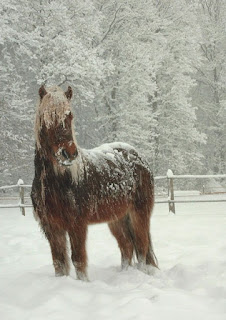Today we mostly talked about how nice the weather was for riding and without giving it much thought I asked if she thought there would be a severe winter this year. She mentioned that it might be since her horse was getting a winter coat.
I immediately concluded that horses were fantastic weather barometers.
Later I researched information about horses and winter coats. It turns out that horses are not triggered to grow a winter coat by temperatures, but by photoperiods. As the hours of daylight decrease, they start to grow longer, coarser coats that become very dense. The hairs stand on end, becoming fluffy and trapping warm air close to the body, insulating it from frigid temperatures, winds, snow and ice. The density of the coat doesn't allow water to penetrate so a horse will stay warm when its raining.
Winter coats typically lasts from September to May. As the daylight increases, the coat begins to loosen and shed usually in late December. It won't be obvious though until much later.
I should have realized that if horses could predict weather, we would have been using that info starting when dirt was invented!
 |
| Icelandic Horse in Heavy Snow |
No comments:
Post a Comment